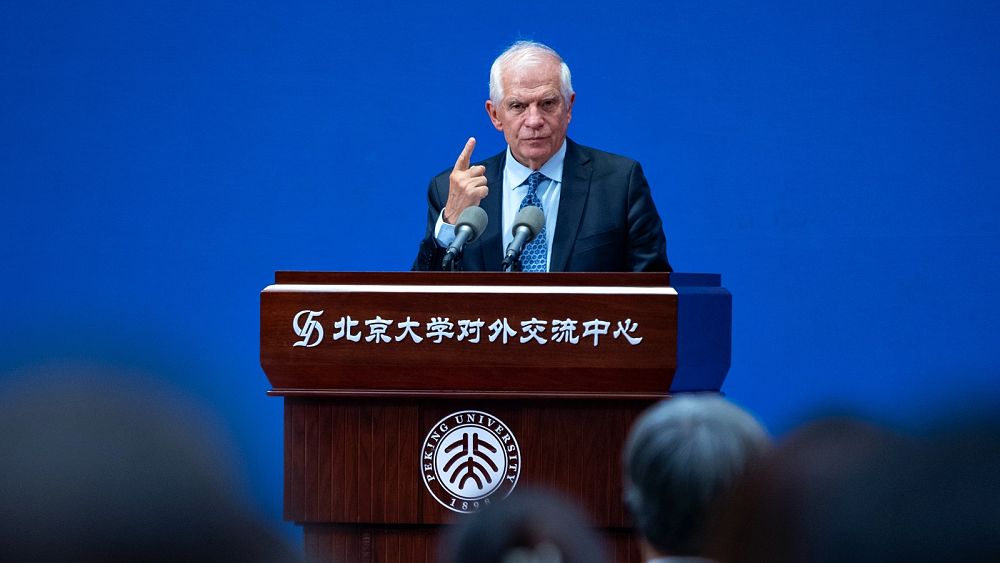World
Multilateralism can’t be about ‘cherry-picking,’ Borrell tells China

The multilateral system “cannot be based on cherry-picking” regardless of how it is reformed, Josep Borrell said during his three-day visit to China.
“The world in which we live is multipolar, but it requires regulation. We need to agree on the basic common principles,” the European Union’s foreign policy chief said on Friday in a wide-ranging speech delivered at Peking University, in Beijing.
“The real problem in our world today is that multipolarity has increased, but multilateralism has decreased. There are more players in the world game, but there are less rules,” he went on. “Multilateralism is in crisis.”
Borrell acknowledged a “peaceful rivalry” between the EU and China over their divergent interpretation of human rights but insisted that “universal values go beyond the values of each individual country. They are bigger.”
He then made a direct appeal to prevent “the right of the stronger” from reshaping the world order, as Russia is attempting to achieve through its large-scale war on Ukraine.
“We have to build rules. The rules precisely exist to protect the small against the big, the less wealthy against the rich,” Borrell said. “We try to abide by the rules, living by multilateralism, which cannot be based on cherry-picking.”
“Accepting the rules of the WTO (World Trade Organization) but not those of the United Nations Convention of the Law of the Sea. We cannot choose the law that we want to fulfil. The system has to be fulfilled completely. This system is indivisible,” he added.
The EU, together with its G7 allies, has long accused China of pursuing a highly selective interpretation of international law. For example, by, on the one hand, strongly defending the principle of national sovereignty and non-interference in domestic affairs while, on the other, waging disinformation campaigns across democratic societies and imposing measures of economic coercion against its critics.
The Chinese equidistant stance in the Ukraine war has also been denounced as a biased application of international law, namely the prohibition of acquiring territory by force.
“We consider essential that China makes a major effort to convince the people of Ukraine that China is not Russia’s ally in this war,” Borrell said.
China has struck back by making similar accusations about the West, criticising, for instance, the multiple rounds of sanctions slapped on Russia as a strategy of “maximum pressure” and “long-arm jurisdiction.” Beijing also resents the EU’s new “de-risking” strategy to reduce vulnerable dependencies, claiming it is a disguised form of protectionism incompatible with WTO rules and being dictated by Washington.
“Our relation is of global significance. It is not swayed by third countries and should not be subject to third-party influence,” Chinese Foreign Minister Wang Yi said on Friday. “We’re able and capable to have high-quality dialogue and cooperation on the basis of mutual respect (…) and build a new paradigm under which civilisations interact.”
Borrell’s pointed reference to the UN Convention of the Law of the Sea appeared to invoke Beijing’s territorial claims in the South China Sea, which are frontally opposed by its neighbouring countries, like the Philippines, Vietnam and Malaysia.
The long-running dispute, which involves a large number of islands, reefs and banks, has been the source of persistent strain and has, at times, raised fears of a wider regional confrontation that could drastically upend global commerce.
The EU has adopted a neutral position on the conflict and urges parties to refrain from unilateral actions that might “endanger peace, security and stability.”
Another issue in the South China Sea that preoccupies Europeans is the tensions in the Taiwan Strait, which are expected to ratchet up in anticipation of the self-ruling island’s January presidential election. China has vowed to reunite Taiwan with the mainland, a goal that has led to rampant speculation about a ground invasion in the future.
During his speech, Borrell repeated the EU’s three-noes approach: no to recognition of Taiwan, no to provocations on any side, and no to the use of force to alter the status quo.
“We have bilateral ties with Taiwan, which don’t imply at all any kind of political recognition as an independent country. We will not do it,” the diplomat said.
“We have to resolve the tensions through meaningful and open dialogue, keeping channels of communication to prevent misunderstandings and to de-escalate tensions.”

World
Fact check: How deadly was 2024 for journalists?

An estimated 104 journalists lost their lives in 2024, with Palestine the most dangerous territory.
An estimated 104 journalists were killed worldwide over the past year, according to data shared earlier this month by the International Federation of Journalists (IFJ).
Another report by NGO Reporters Without Borders (RSF) puts the figure at 54, but its methodology means it only includes killings that are considered “directly related” to journalists’ professional activity.
Both organisations say that Palestine is the deadliest place on earth for journalists. More than half (55) of the 104 killings reported by IFJ were Palestinian media professionals in Gaza, while a further six were killed in Lebanon.
At least 138 journalists have been killed in Gaza since the war between Israel and Hamas broke out on 7 October 2023, making the country one of the “most dangerous in the history of modern journalism, behind Iraq, the Philippines and Mexico,” according to the IFJ.
Reporters without Borders has described the number of killings in Gaza as “an unprecedented bloodbath”.
Israel firmly denies it has intentionally targeted any journalists, but has recognised some that have been killed in its airstrikes on Gaza.
The 104 total killings reported by the IFJ is a slight decrease on the 129 they reported on in 2023, which is considered the bloodiest year for journalists since 1990.
How do other world regions fare?
Asia Pacific is the world’s second most dangerous region for journalists, after the Middle East, according to the IFJ.
It recorded 20 deaths in the region in 2024, of which 70% happened in the southern Asian countries of Pakistan, Bangladesh and India.
The region has seen an “upsurge” in violence, according to the IFJ, with deaths increasing sharply from the 12 recorded in 2023.
Africa was the third most dangerous region for journalists at eight deaths, five of them in war-torn Sudan.
The number of journalists killed in south, central and north America has dropped sharply over the past two years, from 30 in 2022 to six in 2023, and another six in 2024. Mexico, considered to be one of the deadliest places in the world to do journalism, continues to see “threats, intimidation, kidnappings and murders” against journalists, particularly due to reporting on drug trafficking.
Number of journalists behind bars on the rise
According to IFJ estimates on 10 December, there were 520 journalists in prison across the world, considerably more than in 2023 (427) and 2022 (375).
China, including Hong Kong, accounts for most of journalists behind bars, followed by Israel and Myanmar.
The IFJ says the figures show how “fragile” the independent press is and how “risky and dangerous” the profession of journalism has become.
World
Italian state railways plans 1.3 bln euro investment in solar plant

World
Christmas in Puerto Rico is a 45-day celebration with caroling, festive decorations, family feasts and more

Christmas, Navidad in Puerto Rico, extends far beyond Dec. 25.
The island proudly proclaims itself as having the “longest holiday season in the world,” according to the website Discover Puerto Rico.
On average, the holiday festivities in Puerto Rico last about 45 days, per the source, commencing right after Thanksgiving, and stretching all the way through mid-January.
The Christmas season in Puerto Rico typically lasts around 45 days. (iStock)
HOW TO SAY ‘MERRY CHRISTMAS’ IN 10 LANGUAGES TO FRIENDS AROUND THE WORLD
The holiday season in Puerto Rico is full of rich traditions beloved by families.
One tradition those who visit Puerto Rico will immediately notice during the holiday season is decorations.
In Puerto Rico, decorations are typically put up by Thanksgiving, and kept up until the season concludes in mid-January, with opportune picture moments at every corner.
Parrandas, Christmas caroling, is a holiday staple.
17 SECRET TRAVEL TIPS FOR FALL AND WINTER THAT AREN’T SO SECRET AFTER ALL
Carolers choose houses of family and friends to visit, typically starting around 10 p.m., performing aguinaldos (traditional Christmas songs), with not only their voices, but often with instruments as well, according to Discover Puerto Rico.
The group you begin caroling with is likely not the same group you end with.
In Puerto Rico, when carolers visit a house, they’ll often stop inside for conversation, food and drink before moving to the next residence.

Coquito is a popular beverage enjoyed during the holiday season in Puerto Rico. Coconut, vanilla and rum are among the ingredients. (Mayra Beltran/Houston Chronicle via Getty Images)
Usually, the residences of the house visited will join the group for the next house, according to Discover Puerto Rico.
CHRISTMAS TREES IN GERMANY WERE DECORATED WITH APPLES INSTEAD OF ORNAMENTS IN THE 1600S FOR ‘ADAM AND EVE DAY’
A night of serenading loved ones can last quite a while, often stretching into the early morning hours of the following day, according to the source.
The biggest day of the holiday season in Puerto Rico actually isn’t Christmas, but instead, the night before.
In Puerto Rico, Dec. 24 is Nochebuena. On that day, loved ones gather for the exchange of gifts, caroling and a large feast.
Many families will also attend a midnight Mass on the day, known as Misa de Gallo.
FLIGHT ATTENDANTS REVEAL THE SURPRISING DAY TO TRAVEL AHEAD OF THE CHRISTMAS RUSH
After Christmas passes, the festivities go on in Puerto Rico.
Another big event in the holiday lineup is Three Kings Day on Jan. 6, a holiday that “commemorates the visit that the Three Wise Men paid to Jesus after his birth,” according to Discover Puerto Rico.
On the eve of the day, children fill up a shoebox with grass to be left for camels to munch on while the Three Kings leave behind gifts for them, according to PuertoRico.com.
For a particularly festive Three Kings Day, Juana Díaz is the place to go, as it hosts the largest celebration in Puerto Rico for the holiday. In Juana Díaz, there is an annual festival and parade in honor of Three Kings Day that brings together over 25,000 people every year, according to Discover Puerto Rico.

Gifts are primarily exchanged between loved ones on Christmas Eve in Puerto Rico. (iStock)
Then, eight days later is Octavitas, a post-holiday celebration where families get together and celebrate one last time for the season.
The end of the holiday season is marked with the San Sebastián Street Festival.
This festival, spanning over multiple days, takes place in Old San Juan, and is filled with live music, dancing, shopping and parades.
-

 Politics1 week ago
Politics1 week agoCanadian premier threatens to cut off energy imports to US if Trump imposes tariff on country
-
/cdn.vox-cdn.com/uploads/chorus_asset/file/25789444/1258459915.jpg)
/cdn.vox-cdn.com/uploads/chorus_asset/file/25789444/1258459915.jpg) Technology1 week ago
Technology1 week agoOpenAI cofounder Ilya Sutskever says the way AI is built is about to change
-

 Politics1 week ago
Politics1 week agoU.S. Supreme Court will decide if oil industry may sue to block California's zero-emissions goal
-
/cdn.vox-cdn.com/uploads/chorus_asset/file/25546252/STK169_Mark_Zuckerburg_CVIRGINIA_D.jpg)
/cdn.vox-cdn.com/uploads/chorus_asset/file/25546252/STK169_Mark_Zuckerburg_CVIRGINIA_D.jpg) Technology1 week ago
Technology1 week agoMeta asks the US government to block OpenAI’s switch to a for-profit
-

 Business1 week ago
Business1 week agoFreddie Freeman's World Series walk-off grand slam baseball sells at auction for $1.56 million
-
/cdn.vox-cdn.com/uploads/chorus_asset/file/23951353/STK043_VRG_Illo_N_Barclay_3_Meta.jpg)
/cdn.vox-cdn.com/uploads/chorus_asset/file/23951353/STK043_VRG_Illo_N_Barclay_3_Meta.jpg) Technology1 week ago
Technology1 week agoMeta’s Instagram boss: who posted something matters more in the AI age
-
News1 week ago
East’s wintry mix could make travel dicey. And yes, that was a tornado in Calif.
-
/cdn.vox-cdn.com/uploads/chorus_asset/file/24924653/236780_Google_AntiTrust_Trial_Custom_Art_CVirginia__0003_1.png)
/cdn.vox-cdn.com/uploads/chorus_asset/file/24924653/236780_Google_AntiTrust_Trial_Custom_Art_CVirginia__0003_1.png) Technology2 days ago
Technology2 days agoGoogle’s counteroffer to the government trying to break it up is unbundling Android apps


















